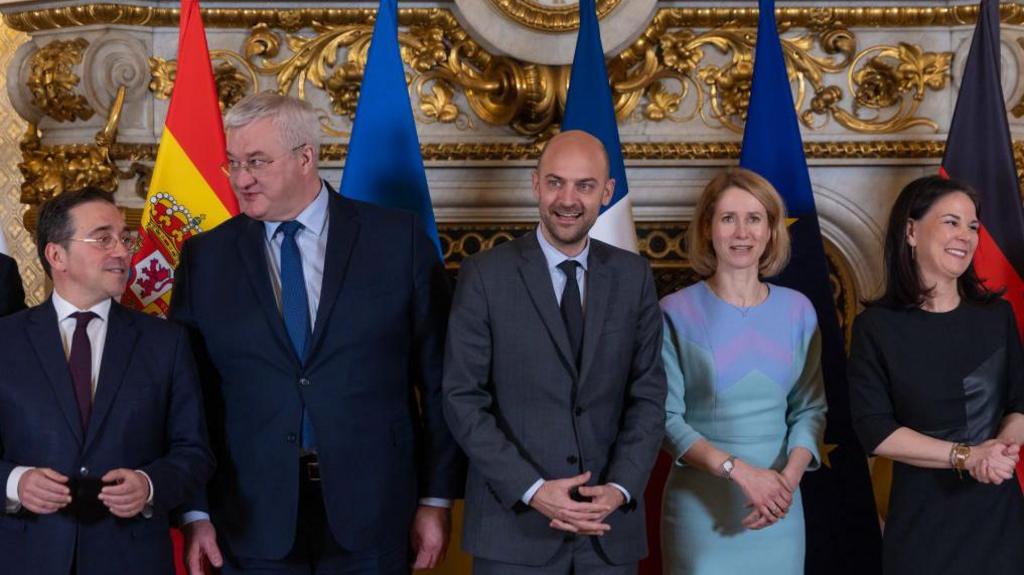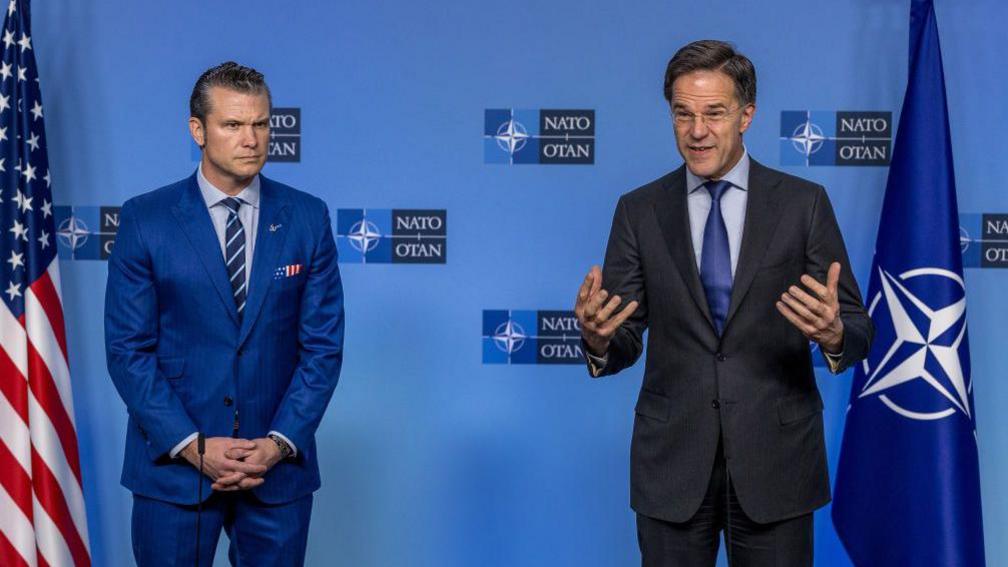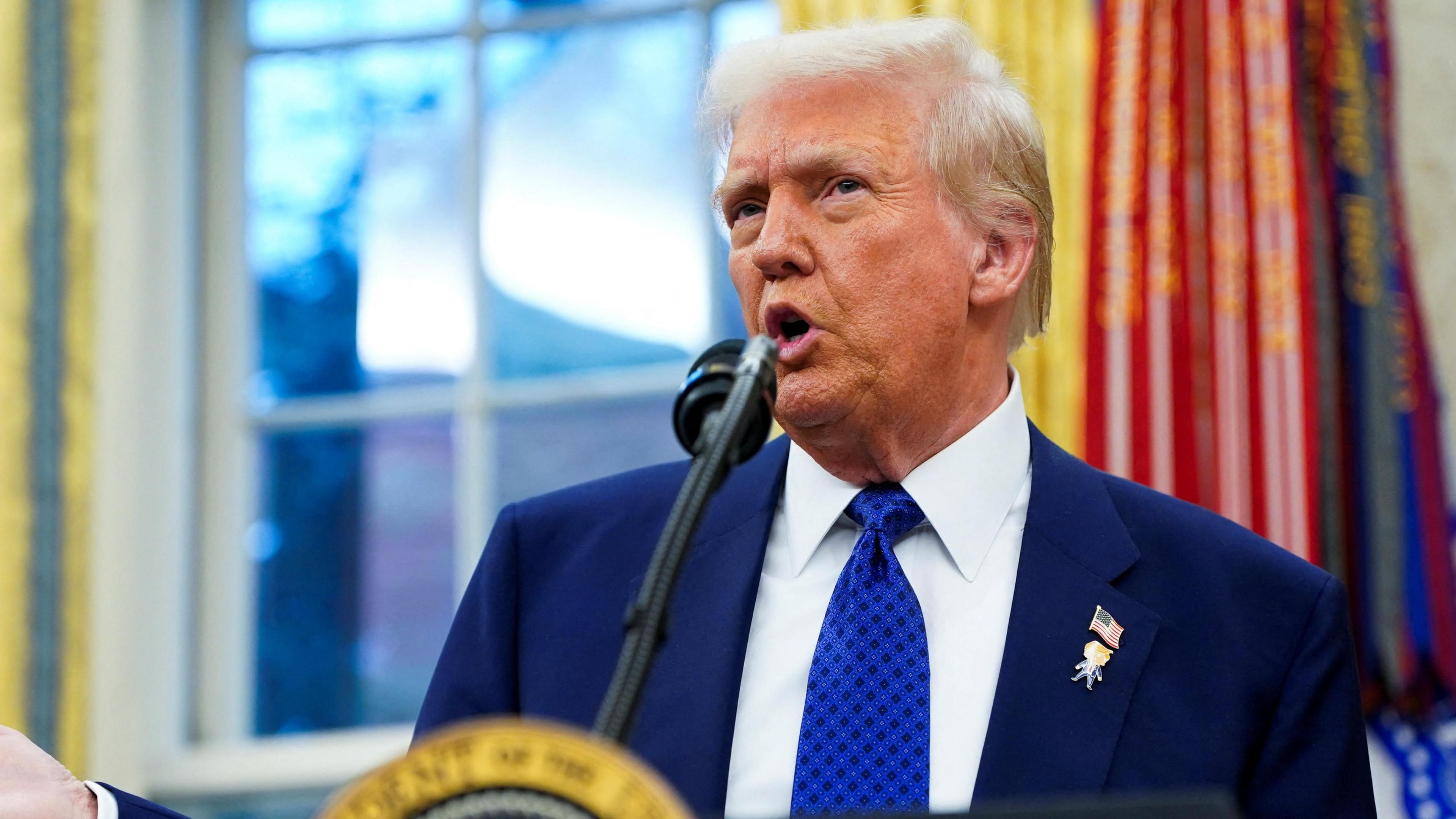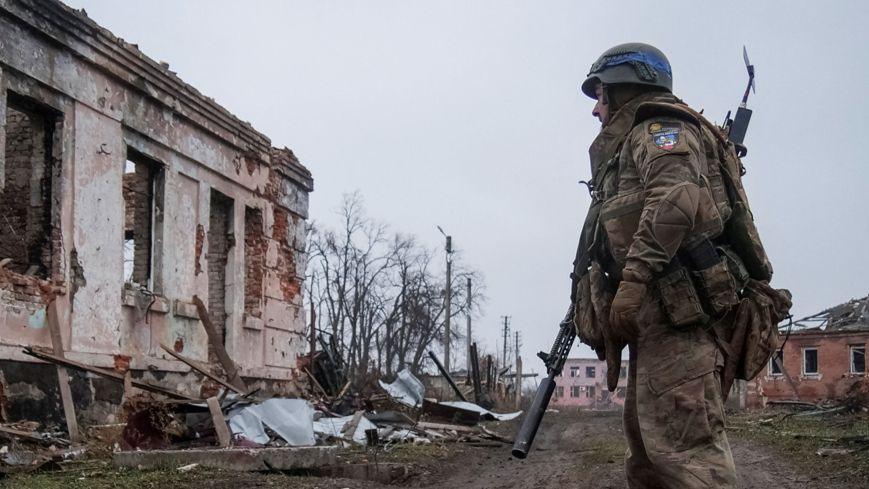Europe caught out by Trump's Russia move

Foreign ministers from major European countries joined their Ukrainian counterpart on Wednesday, as news of Trump's call with Putin emerged
- Published
Arriving at Nato headquarters early on Thursday, Europe's defence ministers had one common message - that there could be no negotiations about Ukraine without Ukraine and Europe at the table too.
The question is to what extent the US is listening.
After a frenetic 24 hours of US declarations, there is a tangible sense that Europe's leaders have been caught by surprise; that they now fear being bypassed on any potential Ukraine deal and being deprived of a voice on the future of European security.
Germany's Foreign Minister Annalena Baerbock spoke of Donald Trump's call with Vladimir Putin as being "very much out of the blue", even if the US president had made it clear for months that he was aiming to bring a quick end to the war.
"There can be no negotiation about Ukraine without Ukraine," said the UK's John Healey.
"The same is true for Europe," warned Dutch Defence Secretary Ruben Brekelmans.
"Because of course what is negotiated also has implications for Europe, so we think Europe should also sit at the table."
Polish Prime Minister Donald Tusk rammed home the message on X when he posted: "All we need is peace. A just peace. Ukraine, Europe and the United States should work on this together. Together."
Hegseth sets out hard line on European defence and Nato
- Published12 February
Trump offers Putin a way back in from the cold
- Published12 February
The US is clearly engaging with its Nato allies and Ukraine. Defence Secretary Pete Hegseth is spending two days at Nato HQ and Vice-President JD Vance will see Volodymyr Zelensky at the Munich Security Conference.
But Europe's problem, and specifically the EU's problem, is that it struggles to speak with one voice and present a united vision.
Ursula von der Leyen, the EU's most recognisable figurehead, met Hegseth this week but has been barely visible since.
Europe's leaders have had plenty of time to prepare for Trump's peace plan. Now they're left wondering whether the US is listening to them, or even reading their communiques.
The UK joined Poland, France, Germany, Italy and Spain late on Wednesday in agreeing that the security of the European continent was "our common responsibility" and that a just and lasting peace in Ukraine was necessary for transatlantic security too.
Baerbock told German radio that obviously Europe could not replace the US in military support for Ukraine, but a strong Europe was in US interest and it had to be made clear that "the USA needs us too".

US Defence Secretary Pete Hegseth (L) joined Nato's Secretary General Mark Rutte in Brussels
Europe could have claimed more agency instead of waiting for Trump's initiative, Tyyne Karjalainen, of the Finnish Institute of International Affairs, said.
"These statements we're seeing now...I'm afraid they're a symbol of weakness not strength," she added.
So far, there is no obvious space for Europe in Trump's peace push, and arguably not enough for Kyiv. Until now there had been a general acceptance that there should be no talking to Vladimir Putin without Ukraine.
Trump is planning face-to-face talks with the Russian leader, apparently in Saudi Arabia, but the two men have already prepared the ground with a lengthy phone-call.
The US president's follow-up chat with Volodymyr Zelensky was far shorter.
Zelensky spoke initially of his belief that "America's strength is sufficient to pressure Russia and Putin into peace".
But on a trip to the southern city of Kherson on Thursday he made clear that, as an independent state, Ukraine would not accept either bilateral negotiations or "any agreements reached without us".
"Putin hopes that by holding talks only with Trump, he will be able to negotiate more favourable terms," Aleksandra Kozioł, from the Polish Institute of International Affairs, said.
"In doing so, he will also present himself as a leader who talks to another superpower on an equal footing."
The worry for European leaders is that the US may have already moved some way towards meeting Russia's war aims - and that it might go further.
Ukraine's consistent demand has been for a complete withdrawal of Russian troops from its sovereign territory and for Ukrainian control over its state borders.
Judging by remarks from Trump and Hegseth, the US already considers Russia's 2014 capture of Crimea and eastern areas in the Donbas as a fait accompli and that Ukraine won't be joining Nato.
Trump added that Ukraine needed fresh elections "at some point", repeating a Putin fallacy that Zelensky was no longer a legitimate leader, even though Ukraine is under martial law precisely because of Russia's war.
Hegseth was adamant there had been no betrayal of Kyiv, but German Defence Minister Boris Pistorius said it was "regrettable...that the Trump administration has already made public concessions to Putin before negotiations have even begun".
"It would have been better to talk about Ukraine's possible Nato membership or the country's possible loss of territory only at the negotiating table and not to take it off the table beforehand," he said.
Along with the evident alarm that Putin may already have the upper hand, there was a clear warning from Nato and the EU on Thursday that any agreement had to last.
Nato Secretary General Mark Rutte said it was crucial that any deal should not unravel as had been allowed to happen with Russia in the past.
"It is always important to bear in mind that Russia is the aggressor here and it cannot be rewarded for its aggression," warned EU Commission spokeswoman Anitta Hipper.
"When it comes to any discussions, any peace deals, it needs to be sustainable. A bad deal will only lead to more war. Just as it did before."
European governments are already expecting to foot the bill to help rebuild Ukrainian cities, but President Trump may ask for European boots on the ground as well, to provide security guarantees.
Not only do Europeans have a strong argument to be involved in the overall plan, but Poland, the Baltic states and the Nordic countries would be especially wary of an emboldened Russia if it fell apart.
Hegseth stressed on Thursday that standing up against Russia's "war machine" was an "important European responsibility", and he reinforced Trump's demand for 5% of economic output (GDP) to be spent on defence.
Few European governments have managed anything like that, while Russia's government is already spending almost a third of its annual budget on defence.
Poland aims to spend 4.7% of its GDP on defence this year and Latvia 3.45%, but Germany has only just hit 2% and Spain and Portugal are hoping to reach 2% in 2029.
Luxembourg's Defence Minister Yuriko Backes acknowledged the US demand but said numbers should not be set arbitrarily.
"What we should be focusing on is our plans and our ambitions that determine our investments not the other way around," she said.
Additional reporting by Kathy Long in Brussels.
- Published13 February

